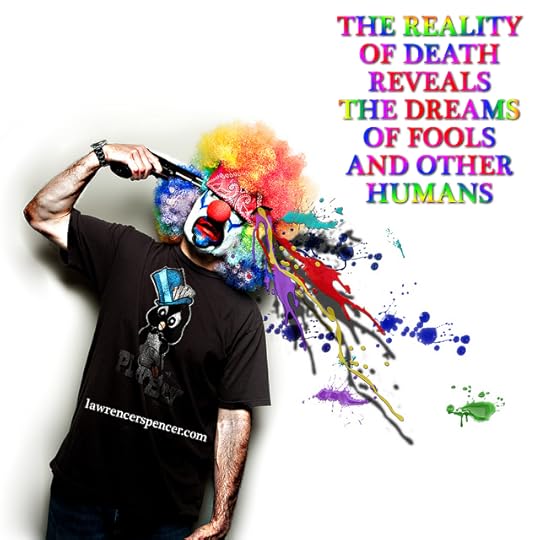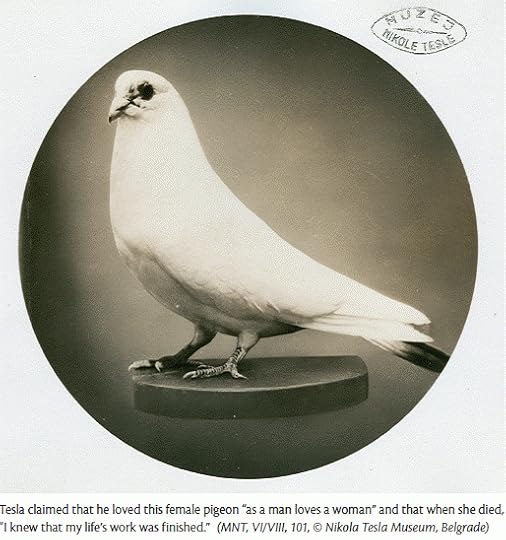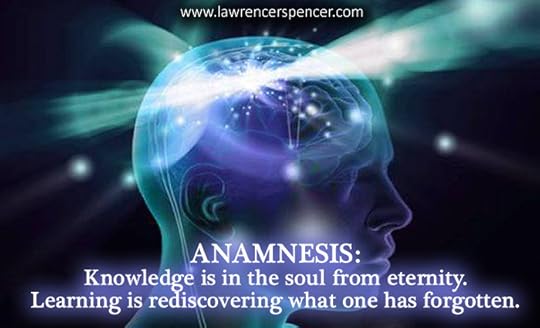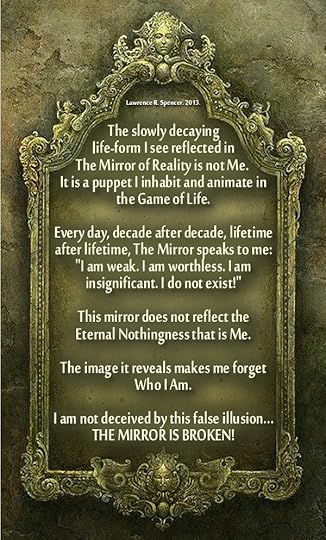Lawrence R. Spencer's Blog, page 549
July 31, 2013
THIS IS NOT A TEST
ASSASSINATIONS
July 30, 2013
LIFE’S ILLUSIONS
Discovering that we do NOT know makes it possible to understand Life, Illusions, Delusions and other Universes.
BOTH SIDES NOW, by Joni Mitchell
"Bows and flows of angel hair
And ice cream castles in the air
And feather canyons everywhere
I've looked at clouds that way
But now they only block the sun
They rain and snow on everyone
So many things I would have done
But clouds got in my way
I've looked at clouds from both sides now
From up and down, and still somehow
It's cloud illusions I recall
I really don't know clouds at all
Moons and Junes and Ferris wheels
The dizzy dancing way you feel
As every fairy tale comes real
I've looked at love that way
But now it's just another show
You leave 'em laughing when you go
And if you care, don't let them know
Don't give yourself away
I've looked at love from both sides now
From give and take, and still somehow
It's love's illusions I recall
I really don't know love at all
Tears and fears and feeling proud
To say "I love you" right out loud
Dreams and schemes and circus crowds
I've looked at life that way
Oh but now old friends are acting strange
They shake their heads, they say I've changed
Well something's lost but something's gained
In living every day
I've looked at life from both sides now
From WIN and LOSE and still somehow
It's life's illusions I recall
I really don't know life at all
I've looked at life from both sides now
From up and down and still somehow
It's life's illusions I recall
I really don't know life at all"
BURNING BOOKS
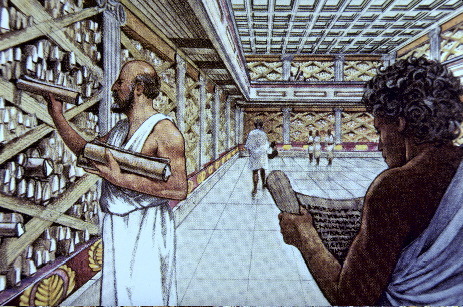 I recently re-read a book from my personal library about the destruction of the greatest library of antiquity in Alexandria, Egypt, The Vanished Library, by Luciano Canfora. Because I write books, I also read books. Books are a gateway to intellectual and spiritual freedom.
I recently re-read a book from my personal library about the destruction of the greatest library of antiquity in Alexandria, Egypt, The Vanished Library, by Luciano Canfora. Because I write books, I also read books. Books are a gateway to intellectual and spiritual freedom.
Although my personal library shelves contain only several hundred volumes, it is estimated by various sources that the Library at Alexandria housed tens of thousands of scrolls amassed by Ptolemy that were added to the sacred library of Ramses II, Pharaoh of Egypt! (c. 1300 BCE) At the time of it's destruction there were reported to be more than 45,000 hand-written books, gathered from all of the civilized word -- translated into Greek -- and housed in a single building.
In 640 AD, this priceless library was burned at the order of Muslim Caliph Omar. When the general of his army asked the Caliph what to do with the books of the library, the Caliph responded:
"If their content is in accordance with the book of Allah, we may do without them. If they contain matter not in accordance with the book of Allah, there can be no need to preserve them. Proceed then, to destroy them."
At that time the city of Alexandria had 4,000 public baths. The water for the baths was heated by underground stoves or furnaces. "The books were distributed to the public baths of Alexandria, where they were used to fuel the stove which kept the baths comfortably warm. ....It took six months to burn all that mass of material." Only the writings of Aristotle were spared from the flames.
As has so often been the case in the history of Earth, religious fanaticism -- the enemy of knowledge and freedom -- was the cause of destruction of precious accumulated knowledge, technology and wisdom recorded by literate scientists, mathematicians, artists, philosophers and scholars. The modern destruction by the United States of the priceless Library of Baghdad, the burning of books and burying of scholars under China's Qin Dynasty, the destruction of Aztec codices by Itzcoatl, the Nazi book burnings, the Spanish Inquisition, and many others psychotic episodes serve to keep humanity stupid, superstition and enslaved by ignorance.
However, in 2013 we live in an age of unprecedented information access. There are thousands of libraries all around the world. The internet is a vast library of information that contains nearly every book that has ever been written! (Of course there are huge numbers of "heretical" books that have been burned by Caliphs or Nazis or hidden in the Vatican library or the Smithsonian Institute.) However, in spite of intellectual terrorism, superstition, religious fanaticism, and government mind-control agendas, we are living in an unprecedented age when books are freely available in abundance! All we need to do is read them.
http://www.beautiful-libraries.com/index.html
July 29, 2013
THE AQUARIUM CLUB
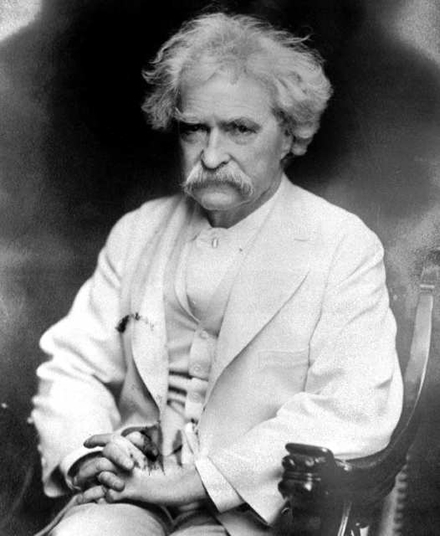 I am a great admirer of Mark Twain (Samuel Clemens). After reading his Autobiography I discovered that Mark Twain became increasingly cynical, depressed and disillusioned by the behavior of the human race. His revolutionary books, Huckleberry Finn and Tom Sawyer were protests against the institution of human slavery in a time when "owning people" for commonplace. Toward the end of his life, in his 70s, Mark Twain became reclusive and bitter about the pain and suffering he witnessed on his extensive travels around the world during lecture tours. This was compounded by the agony and personal responsibility he felt for the death of his infant son, the death of his daughters and his beloved wife. The accumulated tragedy of his his observations and experience as a human being overwhelmed him in the end. He died defeated by the pain of his own compassion for humanity and from the loss of the people he loved the most-- his family.
I am a great admirer of Mark Twain (Samuel Clemens). After reading his Autobiography I discovered that Mark Twain became increasingly cynical, depressed and disillusioned by the behavior of the human race. His revolutionary books, Huckleberry Finn and Tom Sawyer were protests against the institution of human slavery in a time when "owning people" for commonplace. Toward the end of his life, in his 70s, Mark Twain became reclusive and bitter about the pain and suffering he witnessed on his extensive travels around the world during lecture tours. This was compounded by the agony and personal responsibility he felt for the death of his infant son, the death of his daughters and his beloved wife. The accumulated tragedy of his his observations and experience as a human being overwhelmed him in the end. He died defeated by the pain of his own compassion for humanity and from the loss of the people he loved the most-- his family.
Many men who are "dreamers" and "visionaries", like Twain, are highly empathetic. They FEEL the pain of other beings as a personal, subjective pain. Some beings find relief from this chronic agony in drugs or alcohol. Or, they just stop looking and caring. Mark Twain found a temporary relief from his own pain in tobacco, humor, and a "collection" of young girls....
This article is re-posted from the Blog "Today I Found Out":
Samuel Clemens (aka, Mark Twain) used to “collect” girls between the ages of 10-16 years old.
On February 12, 1908, Clemens said, “I suppose we are all collectors… As for me, I collect pets: young girls — girls from ten to sixteen years old; girls who are pretty and sweet and naive and innocent — dear young creatures to whom life is a perfect joy and to whom it has brought no wounds, no bitterness, and few tears.”
Okay, so it isn’t actually as creepy as it initially sounds and in some ways is kind of sweet, but Samuel Clemens did love to entertain young girls. Towards the end of Clemens life, he suffered quite a lot of hardship. His daughter Susy died in 1896 and his wife Olivia passed away in 1904, followed by a second daughter, Jean, in 1909. Clemens fell into a depression in the early 1900s and noted that while he had reached the grandfather stage of life, he had no grandchildren to keep him company. He therefore went about befriending young girls who he treated as surrogate granddaughters.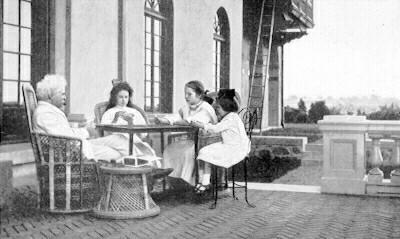
The girls in question were the daughters of couples who ran in his same social circle. He often met them on boats carting him back and forth to England or Bermuda, as was the case with Helen Allen. Allen was just twelve years old when Clemens stayed with her family in Bermuda. Her father was the American Vice-Council in Bermuda; her grandmother had known Clemens’ wife as a child. Clemens said Allen was “perfect in character, lovely in disposition, and a captivator at sight,” everything that Clemens wanted in his collection of young girls.
The group of girls were called “Angel Fish” or “the Aquarium Club.” The name is derived from the fish that Clemens first saw in Bermuda. He decided on that name because the angelfish “is the most beautiful fish that swims.” Clemens would buy angelfish pins in Bermuda and present them to each of his girls. Out of a dozen or so original pins, at least one is still in existence. It currently resides in the Mark Twain Library in Redding, Connecticut.
So what exactly did a man in his late seventies do with a bunch of teenaged girls? All manner of innocent, grandfatherly things. Clemens invited the girls to concerts, the theatre, and to his own house for card games, billiards, and reading. While in Bermuda, several of his Angel Fish had fun riding in a donkey-pulled cart with him. Clemens initially called his estate “Innocence at Home” in honour of “his girls.” He kept in touch with them by exchanging letters when they couldn’t visit, but always kept a room available and hoped to have an Angel Fish “in it as often as Providence will permit.” Before you get too much of a “Michael Jackson” vibe, it should be noted that the girls were always accompanied by a chaperone; the room for the Angel Fish even had two beds to accommodate a mother or guardian along with a girl.
Besides the room, Clemens’ house also had a billiard room which was refashioned into a sort of shrine to the Angel Fish. Above the door was a sign that said “the Aquarium” and inside the walls were lined with framed photos of each of the Aquarium Club’s members.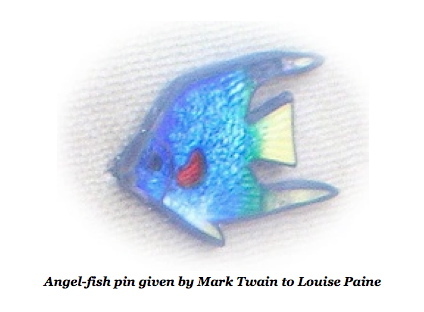
As innocent as it all was, if some celebrity tried to do that today, the press would have a field day with it, insinuating all manner of disgusting things, whether there was any evidence of such acts or not. In his day, it wasn’t really much of a scandal, though Clemens’ remaining daughter, Clara, didn’t appreciate the behavior, perhaps being a tad jealous. When she returned to her father’s home from a stint in Europe to find that her father had collected a group of young girls to entertain, she made her father change the name of his house to “Stormfield” and stopped the household staff from saving letters from the Angel Fish. (Today the full collection of every surviving letter can be read in Mark Twain’s Aquarium: The Samuel Clemens-Angelfish Correspondence.)
The presence of chaperones probably should have put Clara’s mind at ease, but the letters Clemens wrote to his girls would definitely raise some eyebrows today. Shortly after Dorothy Harvey’s fourteenth birthday, he wrote to tell her “I wish I could have those free-gratis-for-nothing-voyages-&-nothing-to-do-but-look-at-you every day.” To Dorothy Quick, just eleven years old, he wrote after one of her visits, “I went to bed as soon as you departed, there being nothing left to live for after that, & all the sunshine gone. How do you suppose I am going to get along without you?” The letters showed his love and devotion to his girls and the enjoyment he experienced in spending time with them, but today parents would likely have used these letters as evidence in civil lawsuits.
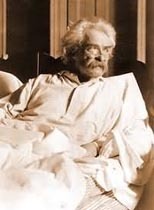 Despite this, only one relationship ever looked to be somewhat improper, and that wasn’t with one of his Angel Fish; further, the inappropriate overtures didn’t come from Clemens. The girl was Gertrude Natkin. He met her when she was fifteen and he was 70 in 1905. The two exchanged letters and Natkin developed a “school girl crush” on Clemens and went somewhat overboard in expressing her affection for him through her letters. Clemens became concerned about this and distanced himself from her- his letters growing more and more infrequent, because he didn’t want to gain a reputation for impropriety nor encourage her affections, perhaps proving that he saw his Angel Fish as nothing more than granddaughters. Certainly, at the time, an adult male courting a 15 year old girl wouldn’t have raised eyebrows, particularly if the suitor was well-to-do and not too old. But at 70, it would have been a scandal even in that time period.
Despite this, only one relationship ever looked to be somewhat improper, and that wasn’t with one of his Angel Fish; further, the inappropriate overtures didn’t come from Clemens. The girl was Gertrude Natkin. He met her when she was fifteen and he was 70 in 1905. The two exchanged letters and Natkin developed a “school girl crush” on Clemens and went somewhat overboard in expressing her affection for him through her letters. Clemens became concerned about this and distanced himself from her- his letters growing more and more infrequent, because he didn’t want to gain a reputation for impropriety nor encourage her affections, perhaps proving that he saw his Angel Fish as nothing more than granddaughters. Certainly, at the time, an adult male courting a 15 year old girl wouldn’t have raised eyebrows, particularly if the suitor was well-to-do and not too old. But at 70, it would have been a scandal even in that time period.
Clemens died on April 21, 1910 of a heart attack, just a few years after establishing the Aquarium Club for his Angel Fish. All in all, there were around a dozen members of the club who visited Clemens regularly until his death, but his enthusiasm for the club waned in the last year of his life; he complained that his girls were growing up too fast, complained about their boyfriends, and cut off one girl when she turned sixteen. In the end, his fondness for them primarily lying in their innocence, as something of a breath of fresh air in a cynical world, waned as they gradually lost that defining feature of children."
July 28, 2013
DREAMS OF FOOLS
July 27, 2013
PINK LIGHT OF VALIS
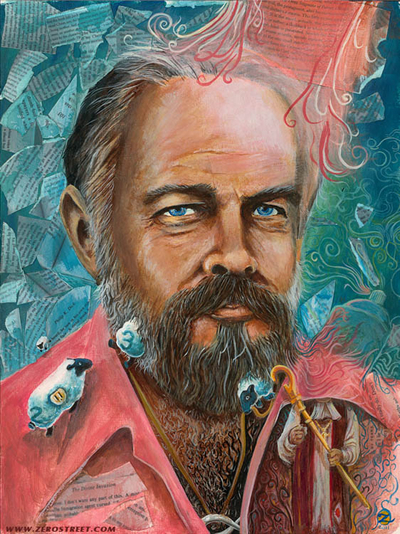 Philip K. Dick (December 16, 1928 – March 2, 1982) was an American novelist, short story writer and essayist whose published work is almost entirely in the science fiction genre. Dick explored sociological, political and metaphysical themes in novels dominated by monopolistic corporations, authoritarian governments, and altered states. In his later works Dick's thematic focus strongly reflected his personal interest in metaphysics and theology. He often drew upon his own life experiences in addressing the nature of drug abuse, paranoia, schizophrenia, and transcendental experiences in novels such as A Scanner Darkly and VALIS.
Philip K. Dick (December 16, 1928 – March 2, 1982) was an American novelist, short story writer and essayist whose published work is almost entirely in the science fiction genre. Dick explored sociological, political and metaphysical themes in novels dominated by monopolistic corporations, authoritarian governments, and altered states. In his later works Dick's thematic focus strongly reflected his personal interest in metaphysics and theology. He often drew upon his own life experiences in addressing the nature of drug abuse, paranoia, schizophrenia, and transcendental experiences in novels such as A Scanner Darkly and VALIS.
Every day there are people who report experiences of "divine communication". They hear "voices" in their heads. Prophecies, epiphanies and revelations of every description have been reported for thousands of years by people all around the world. Yet, there is not empirical "proof" that any of these experiences are "true". They must be "believed to be perceived", or accepted as an act of "faith" by people who did not experience the communication personally. The common denominator of the experiences is that they are personal and subjective.
Philip K. Dick is the enigmatic science fiction author of numerous best-selling books, some of which were adapted into popular films (Blade Runner, Total Recall, A Scanner Darkly, Minority Report and others). In February and March 1974. Dick experienced a series of visions and auditions including an information-rich "pink light" beam that transmitted directly into his consciousness. A year after the events, in March 1975, Dick summarized the 2-3-74 experiences that would pervade his writing for the final eight years of his life:
It, from inside me, looked out and saw the world did not compute, that I - and it - had been lied to. It denied the reality, and power, and authenticity of the world, saying, 'This cannot exist; it cannot exist.'
It seized me entirely, lifting me from the limitations of the space-time matrix; it mastered me as, at the same time, I knew that the world around me was cardboard, a fake. Through its power of perception I saw what really existed, and through its power of no-thought decision, I acted to free myself.
Following this event, Dick experienced a remarkable series of visions, hallucinations, and dreams, many of which centered around the first of a trilogy of books titled "VALIS", a "Vast Active Living Intelligence System". Sometimes it struck him as a pink beam of esoteric data, or as a compassionate feminine "AI [Artificial Intelligence] voice" speaking to him from outer space.
Valis is the first book in Philip K. Dick's incomparable final trio of novels (the others being The Divine Invasion and The Transmigration of Timothy Archer). This disorienting and bleakly funny work is about a schizophrenic hero named Horselover Fat, the hidden mysteries of Gnostic Christianity, and reality as revealed through a pink laser. Valis is a theological detective story, in which God is both a missing person and the perpetrator of the ultimate crime.
I am especially intrigued by the idea of a compassionate feminine voice delivering mind-altering communication through a beam of pink light! I have never experienced any "divine communication" like this personally. But, I believe other people who say they have. However, I remain skeptical as to whether or not the really understand the SOURCE of the communication. Regardless of whether or not these "visions" or "divine interventions" can be "proved" or not, they provide endless hours of inspiration, speculation and discussion. If you are a science fiction fan, like I am, you may enjoy exploring the uniquely esoteric exploration of the subjective universes of Philip K. Dick.
(Read more about Philip K. Dick on Wikipedia.org) and the TOP 10 BOOKS by Philip K. Dick on Amazon.com
July 26, 2013
A PURPOSE FOR LIFE
"I have been feeding pigeons, thousands of them, for years; thousands of them, for who can tell --
"But there was one pigeon, a beautiful bird, pure white with light gray tips on its wings; that one was different. It was a female. I would know that pigeon anywhere."
"No matter where I was that pigeon would find me; when I wanted her I had only to wish and call her and she would come flying to me. She understood me and I understood her.
"Yes," he replied to an unasked question. "Yes, I loved that pigeon, I loved her as a man loves a woman, and she loved me. When she was ill I knew, and understood; she came to my room and I stayed beside her for days. I nursed her back to health. That pigeon was the joy of my life. If she needed me, nothing else mattered. As long as I had her, there was a purpose in my life."
"Then one night as I was lying in my bed in the dark, solving problems, as usual, she flew in through the open window and stood on my desk. I knew she wanted me; she wanted to tell me something important so I got up and went to her.
"As I looked at her I knew she wanted to tell me -- she was dying. And then, as I got her message, there came a light from her eyes -- powerful beams of light.
"Yes," he continued, again answering an unasked question, "it was a real light, a powerful, dazzling, blinding light, a light more intense than I had ever produced by the most powerful lamps in my laboratory.
"When that pigeon died, something went out of my life. Up to that time I knew with a certainty that I would complete my work, no matter how ambitious my program, but when that something went out of my life I knew my life's work was finished."
___________________________
-- From PRODIGAL GENIUS: The Life of Nikola Tesla by John J. O'Neill:
ANAMNESIS
Anamnesis (/ˌænæmˈniːsɪs/) is a concept in Plato's epistemological and psychological theory that he develops in his dialogues Meno and Phaedo, and alludes to in his Phaedrus.
It is the idea that humans possess knowledge from past incarnations and that learning consists of rediscovering that knowledge within us.
Socrates suggests that the soul is immortal, and repeatedly incarnated; knowledge is actually in the soul from eternity, but each time the soul is incarnated its knowledge is forgotten in the shock of birth. What one perceives to be learning, then, is actually the recovery of what one has forgotten. (Once it has been brought back it is true belief, to be turned into genuine knowledge by understanding.) And thus Socrates (and Plato) sees himself, not as a teacher, but as a midwife, aiding with the birth of knowledge that was already there in the student.
Plato develops his Theory of Anamnesis, in part by combining it with his theory of Forms. First, he elaborates how anamnesis can be achieved: whereas in Meno nothing more than Socrates' method of questioning is offered, in Phaedo Plato presents a way of living that would enable one to overcome the misleading nature of the body through katharsis (Greek: κάθαρσις; “cleansing” (from guilt or defilement), “purification”). The body and its senses are the source of error; knowledge can only be regained through the use of our reason, contemplating things with the soul (noesis). Secondly, he makes clear that genuine knowledge, as opposed to mere true belief (doxa), is distinguished by its content. One can only know eternal truths, for they are the only truths that can have been in the soul from eternity.
For the later interpreters of Plato, anamnesis was less an epistemic assertion than an ontological one. Plotinus himself did not posit recollection in the strict sense of the term, because all knowledge of universally important ideas (logos) came from a source outside of time (Dyad or the divine nous), and was accessible, by means of contemplation, to the soul as part of noesis. They were more objects of experience, of inner knowledge or insight, than of recollection.
_______________________
Socrates -- (c. 469 BC – 399 BC) was a classical Greek Athenian philosopher. Credited as one of the founders of Western philosophy, he is an enigmatic figure known chiefly through the accounts of later classical writers, especially the writings of his students Plato and Xenophon and the plays of his contemporary Aristophanes.
Plato -- (428/427 BC– 348/347 BC) was a philosopher in Classical Greece. He was also a mathematician, student of Socrates, writer of philosophical dialogues, and founder of the Academy in Athens, the first institution of higher learning in the Western world. Along with his mentor, Socrates, and his student, Aristotle, Plato helped to lay the foundations of Western philosophy and science.
-- Reference Source: Wikipedia.org
July 24, 2013
THE MIRROR IS BROKEN
The slowly decaying
life-form I see reflected in
The Mirror of Reality is not Me.
It is a puppet I inhabit and animate in the Game of Life.
Every day, decade after decade, lifetime after lifetime, The Mirror speaks to me:
"I am weak. I am worthless. I am insignificant. I do not exist!"
This mirror does not reflect the Eternal Nothingness that is Me.
The image it reveals makes me forget Who I Am.
I am not deceived by this false illusion...
THE MIRROR IS BROKEN!
____________________
Lawrence R. Spencer. 2013.




